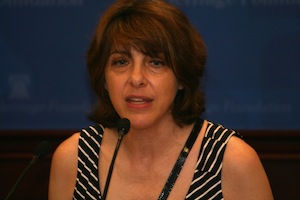How Elites Subvert Policy
Elites, particularly academic ones, think that foreign policy is too important to be left to the American public, but the reverse may be true.
At the Cato Institute earlier this summer, George Mason University professor Trevor Thrall said that the American public today wants to “avoid being dragged into another sectarian fight in the Arab world.” Thrall pointed out that a mob mentality, or what he calls the “aggregate opinion of the crowd,” may not get everything right.
Thrall flatly stated that he has “great doubts of the wisdom of the crowd” and that “wise presidents should ignore the crowd.” And, on top of that Thrall believed that “people are not just individually ignorant, but collectively ignorant.” He made another plug about the mob mentality and said, “American majorities are wrong about really, really important things” such as slavery and historically were “too slow to recognize the rise of Hitler…somewhat overeager on Iraq in 2003.”
He said that the Americans do not understand important parts of policies, like trade-offs, and too often “respond to poll questions in a vacuum.” Americans, Thrall lamented, “express their feelings and emotions rather than their lack of knowledge” and these polls “reflect feelings about the president and the rest of the world,” but “don’t provide much in conventional wisdom.”
“Majorities are illusory,” he averred.
Also at Cato, on the same panel, George Washington University’s Danny Hayes said that Americans do not pay attention to foreign policy and current events because they have other things like “Kanye West and [Kim] Kardashian baby” to think about. As a result, the American people look to the president and prominent leaders of Congress for guidance.
Most of the time, Americans get their information “almost exclusively through the news media” and their opinions then reflect the opinions of the political elites, the president, their elected leaders in Congress and some would say media pundits. Surprisingly, sometimes Americans listen to the international community on certain issues. Either way, “there’s an important role for the media” in informing and engaging the American public opinion.
 At Accuracy in Academia’s most recent Author’s Night, Diana West, author of American Betrayal: The Secret Assault on Our Nation’s Character, argued that the Cold War has been hidden and obscured from the eyes of the public to hide the true narrative of socialist and Communist infiltration into the various branches of the American government. President Franklin Delano Roosevelt even claimed that the Soviet Union allowed freedom of religion under its constitution.
At Accuracy in Academia’s most recent Author’s Night, Diana West, author of American Betrayal: The Secret Assault on Our Nation’s Character, argued that the Cold War has been hidden and obscured from the eyes of the public to hide the true narrative of socialist and Communist infiltration into the various branches of the American government. President Franklin Delano Roosevelt even claimed that the Soviet Union allowed freedom of religion under its constitution.
She compared the policies of presidents from Roosevelt to Reagan towards the ideology of communism with the efforts of the last two presidents to fight the so-called “war on terror” while calling radical Islam a “religion of peace.”
Just as the American anti-Communists of days gone by were called “red baiters” and marginalized by elites so too, today’s voices of reason about the dangers of radical Islamists are also “effectively silenced…thoroughly discredited” by liberals, the media and those in the government. By doing so, it stops the discussion cold in its tracks and helps promote the ideology.
“More people ‘know’ that J. Edgar Hoover wore a red dress around the Plaza Hotel—a total fabrication—than know the first thing about Lauchlin Currie, Harry Dexter White, and their epic treason against this country that delivered millions of people to misery and death,” West writes in American Betrayal.
Of the former, West writes, “Currie started working in the White House in 1939, where his activities on behalf of the Kremlin appear in nine Venona cables (KGB code name ‘Page).” The Venona cables were the messages that Soviet agents sent to and received from the USSR that the U. S. government intercepted and decoded. White also appears in Venona.
Intelligence history, West points out, rarely makes it into histories, particularly academic ones. The integration of the former would require the revision of the latter.
And what would be achieved by such an exercise? Well, accuracy, all around.
“As a society we gaze, stupefied, at those Warhol portraits of murderer Mao over the gas logs in the fireplace, and think they make life soigné; we snarl, reflexively, at a demonology centered around Senator Joe McCarthy, inhaling with salubrious indignation over the dastardly deeds of the Evil One,” West avers.
Spencer Irvine is a staff writer at Accuracy in Academia.
If you would like to comment on this article, e-mail contact@academia.org.




